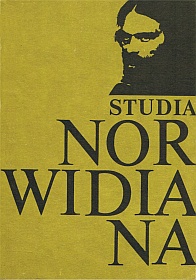Meaning and Necessity
Abstract
There are many different meanings of meaning in the Norwidian universe of discourse. This paper will focus on three aspects of meaning: the verbal, semantic, and honorific. The verbal aspect sets aside non-verbal media; the semantic concerns the relationship between words and things; and the honorific designates some standard of values.
For Norwid language in action is a form of intercourse; and the most important dimension of human speech is its dialogical character. His idea of dialogue is based on the premises that (1) the real source of meaning lies in the actual person and (2) human cognition is always partial or “dramatic” in a sense close to Kenneth Burke’s usage of this term.
As Norwid insisted, social institutions have a life of their own. Language is one such institution - with its usages, clichés, conceptual frameworks and forms of discourse. Language, being the product of people, is also their master. It perpetuates itself in order to express its own message through the mouths of men and women.
Thus, there exists an intricate mechanism of language, which transforms personal utterances into the vehicle of collective forces and depersonalized meanings. Juxtaposed to this are individual human beings who try to overcome the inertia of entrenched language structures. As it turns out, some speech events are only products of alienated forces, but others are invested with real meanings. That is, it is not beyond human capacity to speak truly about the facts, to establish by verbal means authentic interpersonal contact, and to perform other felicitous speech acts. It is not impossible to achieve this through language, but it is a difficult task, and in some specific circumstances it amounts to an act of cultural heroism. For Norwid, to be free is to see clearly to what extent we are in the grip of necessity. And to see clearly is not only a question of intellectual skills, for cognitive processes are motivated by irrational impulses. We need to overcome those impulses in us which render our thought deviant from the straight course of true knowledge. Wisdom and courage are interconnected.
In Norwid’s literary works the idea of self-consciousness is realised not only as a fully developed theme but also serves as their deep structure. One can see this from his strategy of making metalanguage statements. It seems that he could not separate objective reporting discourse from a constant commentary on his own ongoing discourse. He exploited every conceivable technique of mediated expression: pastiche, parody, and irotfy.
In some aspects Norwid could be treated as a counterrevolutionary in the wake of the Romantic revolution. The antiutopian direction of his political reasoning rather strictly parallels his sceptical attitude toward the possibility of a “new deal" in arts, where literature would be free from all previous constraints, and language would be outside all-too-human conditions. From Norwid's standpoint, the rules of literature and the rules of society are the constitutive elements of their respective domains. Perhaps they must be reformed, or perhaps some of them must be abolished and others introduced in their place. Nevertheless the rules must be obeyed. In the Norwidian world there is no escape from convention and one can deal with it in only two ways: either by taking it into account or by ignoring it. In the first case we are making use of a convention; in the second case a convention is making use of us. Thus, literature must take advantage of its inherent conditions and develop from the code of genre and other formal rules the bearers of truly original meaning.
Copyright (c) 1984 Studia Norwidiana

This work is licensed under a Creative Commons Attribution-NonCommercial-NoDerivatives 4.0 International License.





